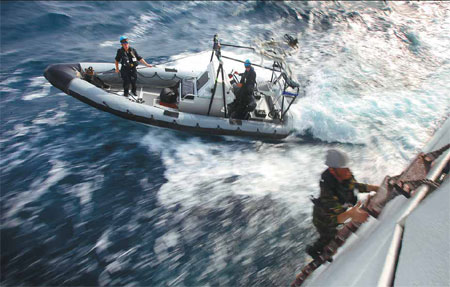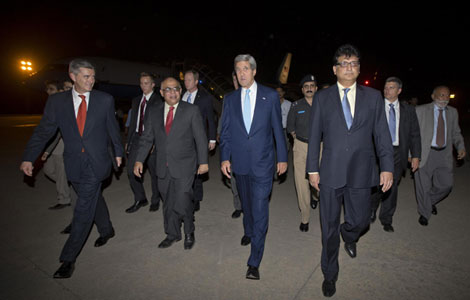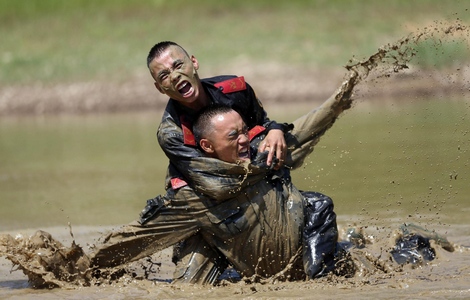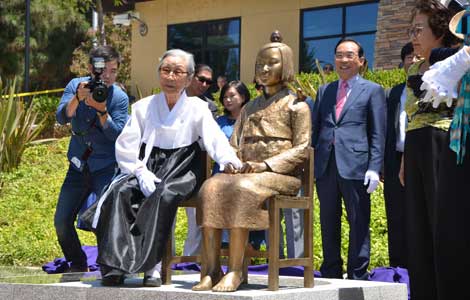Peace Ark: Recharging the batteries
Updated: 2013-08-01 07:44
By Peng Yining (China Daily)
|
||||||||
|
Officers from a Dutch escort ship the Van Speyk arrive for a visit to the Peace Ark. Ju Zhenhua / for China Daily |

Psychological counseling offered by hospital ship helps crews stay healthy in mind and body, reports Peng Yining in the Gulf of Aden.
Editor's note: On June 10, the Peace Ark embarked on a 118-day voyage to provide medical assistance in a number of countries and take part in joint operations and exercises with fellow members of ASEAN. This is the fourth report by China Daily's Peng Yining.
Li Wei's five months aboard an escort ship in the middle of the Gulf of Aden have been a high-pressure existence.
The 33-year-old marine engineer is no stranger to the rigors of life at sea.
There is the roar of the machinery in the engine room, with the nonstop sound and vibration from the ship's screw just a few meters away from his double-decker bunk.
Then there is the limited space in the cabin he shares with 17 other sailors, and the hot and humid weather.
He has had all of them in his previous deployments, but they suddenly became unbearable.
Li, a member of the People's Liberation Army navy for more than 15 years, has been on an 80-day mission before, but this is his first deployment since the birth of his daughter six months ago.
"I felt sick within a month of leaving port," he said. "I really miss my wife and baby girl."
He admitted that he hadn't slept well for months and noticed that his heartbeat has been unusually rapid. "I heard three months ago that the Peace Ark was coming to provide medical and psychological services. Since then, I've been counting the days," he said.
The Chinese hospital ship sailed from East China's Zhejiang province on June 10 on a 118-day voyage to provide medical services to eight countries in Asia and the Indian Ocean. The work the ship's medical specialists have undertaken on behalf of the Chinese and foreign escort fleets in the Gulf of Aden has been one of the most important aspects of the 2013 Peace Ark mission, according to Guan Bailin, head of the Chinese Navy's health department and Peace Ark's deputy commander.
"Life on deployment is tough. Sometimes only sheer willpower keeps everything going," he said. "In addition to the general medical treatments, the ship also provides psychological services. Peace Ark is like a battery recharge for the crews in the gulf and helps them stay healthy, physically and mentally."
During its stay in gulf waters, the ship was visited by the crews of three Chinese escort vessels. More than 500 sailors and officers came aboard for general health checks and around 20 of them, including Li Wei, received psychological counseling.
"It was good to have someone to talk with," said Li. "When you're out at sea, you can be with hundreds of people but still feel lonely. At my lowest ebb, I thought I couldn't finish the deployment, but I feel much better after the consultation."
Positive feedback
"Li has been working under extreme pressure and he feels guilty for being apart from his family," said Ma Haiying, a Peace Ark psychologist and a specialist at the Chinese Navy's Medical Research Institute. "Sometimes a high level of anxiety can cause feelings of physical discomfort, such as insomnia."
During the 60-minute consultation, Ma taught Li a number of relaxation techniques to use before going to bed, such as repeatedly wrapping his arms across his chest and then releasing them.
"I also gave him some positive feedback and reminded him how important his job is. Millions of people are living safely with their families because of his sacrifice," Ma said. "He's going to spend a further 70 days in the gulf, so it's better to deal with the pressures with a positive attitude."
Many sailors experience psycho-emotional stress a couple of months into a voyage, because of the harsh, bumpy life out on the ocean, long hours on night shifts and the pressure of working in a strange and dangerous environment, according to Ma.
She stressed that psychological counseling doesn't equate to an admission of mental illness. The service she provides helps the sailors to stay in peak condition so they can continue to work efficiently and effectively. "A positive mental attitude helps them to be better sailors and better people," she said.
"Out at sea, you can turn through 360 degrees and see nothing but water. It definitely changes the way you look at the world. All the things you are familiar with on land have gone. You can't even see a single green leaf," she explained.
The only green plant on the vessel, which has a crew of more than 400, is a pot of aloes in Ma's consulting room. The psychologist said the plant makes her office cozier and more comfortable for visitors.
"At the beginning of a voyage you don't notice how much you miss things on land. But after a month or so, crew members started to come to my office to touch the plant and even take photos of it."
Mental adjustment
Xie Ruqing, chief medical officer of the Chinese escort fleet, said the excitement everyone felt during the first few weeks of the deployment has now faded and the unusual has become commonplace. "After a few months, the gulf starts to become boring. Every day is the same as the day before," he said. "You find yourself repeating the same actions over and over again."
He said the Chinese navy pays great attention to the mental health of the sailors. "We organize activities, including parties, movie nights and sports meetings. They're good ways to relieve boredom and anxiety," said Xie. "We don't have psychologists on every ship, but the departmental chiefs talk to their crews as often as possible to ensure that everyone is in good condition."
Eventually most members of the crew become accustomed to life on deployment and just get on with their work, according to Xie.
During a lecture on mental adjustment, Ma was trying to explain and induce group hypnosis to the Peace Ark's dozens of helicopter pilots and ground support crews.
"Hypnosis? What if I fall asleep during the lecture?" asked one officer. "Then you'd better not snore," replied another, prompting gales of laughter.
Hypnosis is actually just autosuggestion guided by a psychologist, according to Ma. It has very little to do with actually falling asleep, instead it opens a door to the subconscious and allows you to do things in your mind you can't do in reality, such as visualizing taking a trip home.
"There is a door you are familiar with. It's the door of your home. Open it, and you'll see your families. Maybe it will be your parents, your wife or your child," said Ma, speaking gently as soft music played.
The porthole curtains were pulled tight, the lights were dimmed and the crew sat with their eyes closed; everyone was imagining a journey home. Suddenly, one officer jumped up and ran out the room sobbing.
He later consulted Ma. He told her that he is on his first deployment and he is suffering equally from seasickness and homesickness.
"Military officers are usually too proud to cry," said Ma. "Hypnotic suggestion can relax them and help release the pressure. That's much healthier than suppressing their emotions."
More than 300 members of the Peace Ark's crew recently filled in a questionnaire handed out by the medical team. In response to the question, "What has bothered you most during the voyage?" key answers such as "seasickness", "homesickness", "loss of appetite" and "irritability" cropped up frequently.
Emotional support
Fang Jinxing, a 22-year-old sailor on a Chinese escort ship, underwent hernia surgery on the Peace Ark. In addition to the medical care he received during his 10-day stay, Fang was impressed by the psychological counseling services on offer, including consultations and psychotherapy courses.
"The hernia had been bothering me for two months. Sometimes it hurt so much that I wasn't able to do my work. Other members of the crew and my supervisor helped me, but I was still very frustrated because I really wanted to do a good job," he said. "I tried hard to keep going, but in the end I was stuck in my cabin, doing nothing but lying on my bed. It was like a double attack; physical and mental."
It was the first time he had received treatment via hypnosis; after the first session he didn't want to open his eyes because, "The feeling was so comfortable and relaxing."
The young sailor felt the time he'd spent aboard the Peace Ark had been highly beneficial. "I'm recovering well from the surgery and feeling much better," he said. "I think I'm ready to return to my ship."
Colonel Hoff, a general surgeon aboard the Van Speyk, an escort ship from the Netherlands, said that while his ship's complement doesn't include a psychologist, it does include a priest, who provides emotional support to both Christians and non-believers. However, members of the crew often visit psychotherapists when back on dry land and the navy has a well-developed support service, he said.
"The hardest part of any voyage has always been losing contact with family and friends, but now we are allowed to make phone calls and also have access to the Internet," said Onno Boshouwers, a staff officer on a Turkish escort ship. "Mental health is very important during a voyage, but most navies don't use onboard psychological specialists. However, we have some spiritual guides, people you can go and talk to. The Chinese navy is very professional and thoughtful to have a psychologist on board."
"We've taken good care of all of our sailors and officers in the gulf, and we sent specialists to those who were unable to come aboard for whatever reason," said Guan, Peace Ark's deputy commander.
"I believe the medical services provided by doctors and nurses from their homeland is a good mental comfort for the sailors, because it helps them realize that the people back at home care about them and are thinking of them. They've been working extremely hard on behalf of the country and the people, and they deserve our care and help," he said.
Contact the writer at pengyining@chinadaily.com.cn
Ju Zhenhua contributed to this story.
(China Daily USA 08/01/2013 page7)
Most Viewed
Editor's Picks

|

|

|

|

|

|
Today's Top News
7.5% GDP growth 'in reach' this year
Surveillance plan files declassified
Xi vows to protect maritime interests
Snowden's father thankful to Putin
UN to probe alleged Syria chemical attacks
Saudi blogger faces lashes for 'insulting Islam'
Memorial a tribute to WWII 'comfort women'
Hollywood unpaid for movies
US Weekly

|

|
















